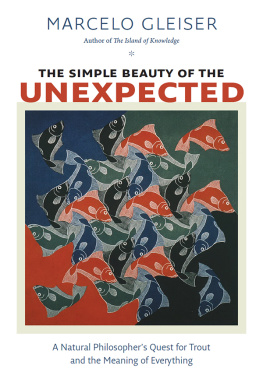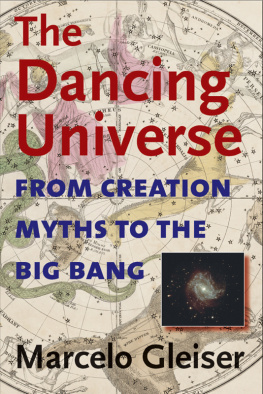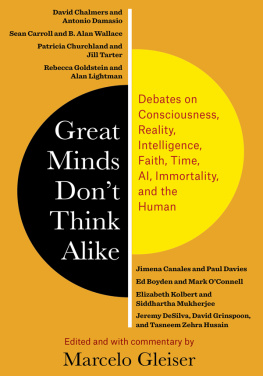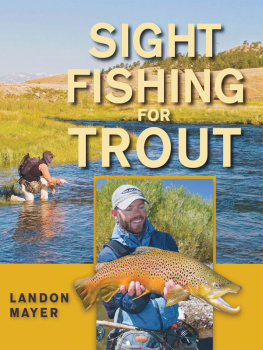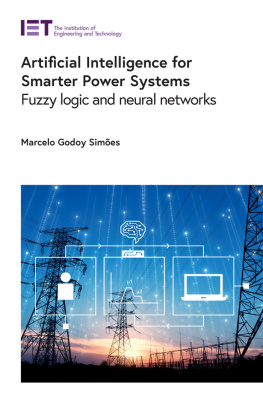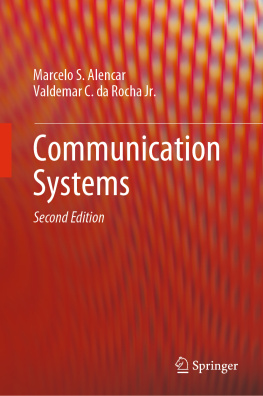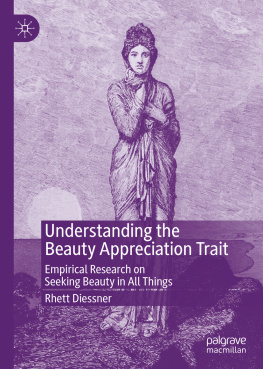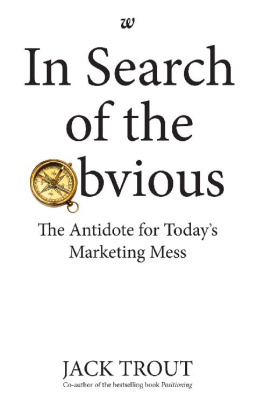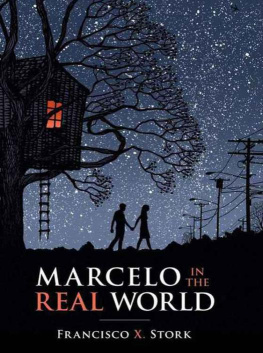
ACKNOWLEDGMENTS
This book is, first and foremost, an expression of my love for the natural world. Over the years, I have been privileged to experience so much of it through my professional wanderings around the globe. Im thankful for having had the opportunities that I have, and for the support of so many of my colleagues throughout the years.
I first thank my wife, Kari, for her wisdom and companionship, for knowing what I need and for knowing how to tell me. I am blessed by her light every day.
I thank my editor Stephen Hull for his interest in this project and for his unwavering support of my not-so-conventional style-breaching narrative. I also thank my agent, Michael Carlisle, for his always-wise guidance.
Finally, I dedicate the book to all the trout out there that manage to dodge the constant human intrusion into their world. Like the equations we cannot solve, their essence will remain unknown to us, filling us with awe and admiration.
If you dont expect the unexpected
you will not find it.
HERACLITUS

Cumbria, Lake District, UK

On Unsolvable Mysteries
The journey had begun. I Googled Fly-fishing Lake District, and bingo! Lots of places to go, beautiful, pristine rivers and lakes filled with trout and grayling, salmon too, depending when you go. I had hiked through parts of the Lake District with my girlfriend when I was a graduate student in England during the mideighties. My misty memories of the place were suffused with breathtakingly beautiful barren hills and warm flesh. Fishing couldnt have been further away from my mind then.
My next step was to choose a guide. Having but a few days to arrange everything, I e-mailed three names, all of guides based in the Lake District. The third on the list, Mr. Jeremy Lucas, was the one I decided to go with. Why? Well, Jeremy told me he would take me to the famous River Eden. I figured I couldnt pass up a river with such a name.
In the end, it was a very serendipitous choice. Jeremy turned out to be precisely the kind of guide-mentor I needed. He was then a member of the English fly-fishing team and had just gotten the silver medal at the most recent world championship. How about that? The clumsy apprentice would be learning from someone of such eminence! I was nervous, fearing I would greatly embarrass myself. I knew my casting left much room for improvement and that I had a lot to learn. I kept thinking of the famous words from the Buddha: All beginnings are obscure. Fortunately, being a teacher helps you be a better student. I remembered that I too was a mentor and had students at all levels, from beginners to advanced. I was hoping that Jeremy would be as kind and patient with me as I try to be with beginners. You know that in order to learn you must want to learn. The worlds greatest teacher couldnt teach someone whos not willing to be taught. And I wanted to learn all right. So I had that going for me.

Sometimes things do seem to happen for a reason. Some call these events happy coincidences, others call them the work of God, or of many gods, while others see them as manifestations of your karma. Being an agnostic (more on this later), I tend to like the happy-coincidence choice better, finding supernatural maneuvering a far-fetched hypothesis. In fact, the whole notion of a supernatural influence doesnt really make sense. After all, an influence denotes a physical occurrence or an event. And an occurrence is something that happens in the physical world through some kind of energy exchange. Any kind of energy exchange or force is very natural and requires a very natural cause. In other words, as soon as the supernatural becomes physical enough to be noticed or detected in some way, it cant remain supernatural anymore. A supernatural influence is an oxymoron. That said, there have been a few events in my life that defy logical explanation; at any rate, that defy any logical explanation that I could come up with. Although my position may sound somewhat shockingespecially coming from a scientistto those who bet on our ability to explain everything, Id argue that some things are unexplainable. In fact, Ill go further and argue that the unexplainableto be distinguished from the not-yet-explained, which is the province of scienceis unavoidable. And should be welcomed.
We are surrounded by mystery, by what we dont know and, more dramatically, by what we cant know. Hence my metaphor of the Island of Knowledge, which I elaborated in a recent book and briefly review here:we stop asking questions about Nature, there is no possible end to our search. Furthermore, scattered along the ocean of the unknown are regions of unknowables, questions beyond the reach of scientific inquiry. We will have more to say about those later on.
Powerful as they are, our brains are limited, as are the tools of scientific inquiry, the machines we use to collect data about the world. Every measuring device has a range and a set precision. Telescopes can see only so farthat is, they can collect light from sources up to a certain distance. Whatever lies beyond their reach cant be seen, even if its as real as what is seen. The same applies to microscopes, of course. Tiny things may escape detection, even if they are there, as real as the things we can see with the naked eye. If we continue into the world of subatomic particles, the smallest entities that exist, how far we can probe into the heart of matter depends on the machines we can build. Particle accelerators, such as the Large Hadron Collider at CERN, the European Organization for Nuclear Research, can probe matter only up to a certain limit. Whatever exists below that limit goes undetected. We may increase the accuracy of our machines and thus probe smaller distances, but we cant do this indefinitely, up to zero distance. There is no perfectly accurate, all-seeing measurement. We are permanently myopic to some fraction of what exists.
Therefore, we must conclude that this ever-growing body of knowledge called science cannot explain all there is for the simple reason that we wont ever know all there is to explain. How could we possibly know all the questions to ask? To presume that we can know all there is to know only shows how supremely arrogant some people can be. It also flies against all that we have learned about how science generates knowledge.
Some may consider my task of exposing the limits of science to be dangerously defeatist, as if I were feeding the enemy. (Ive been accused of that.) But that is surely not the case. To understand the limitations of science is not the same as labeling it as weak or exposing it to the criticism of antiscience groups, such as Bible literalists. It is, in fact, liberating to those who consider it, as it frees science from the burden of being godlike, all-knowing and all-powerful. It protects its integrity in a time when so many claims from scientists get inflated beyond their validity, either by those making them (they should know better) or by the media. Cases in point: statements that we understand the physical mechanisms behind the Big Bang, which we do not, or that life is ubiquitous in the Universe, which we know not. Scientists should be quite careful about what they say and how they say it, as their pronouncements carry weight in the social sphere. Furthermore, and this is a key point for us, why should we
Next page
